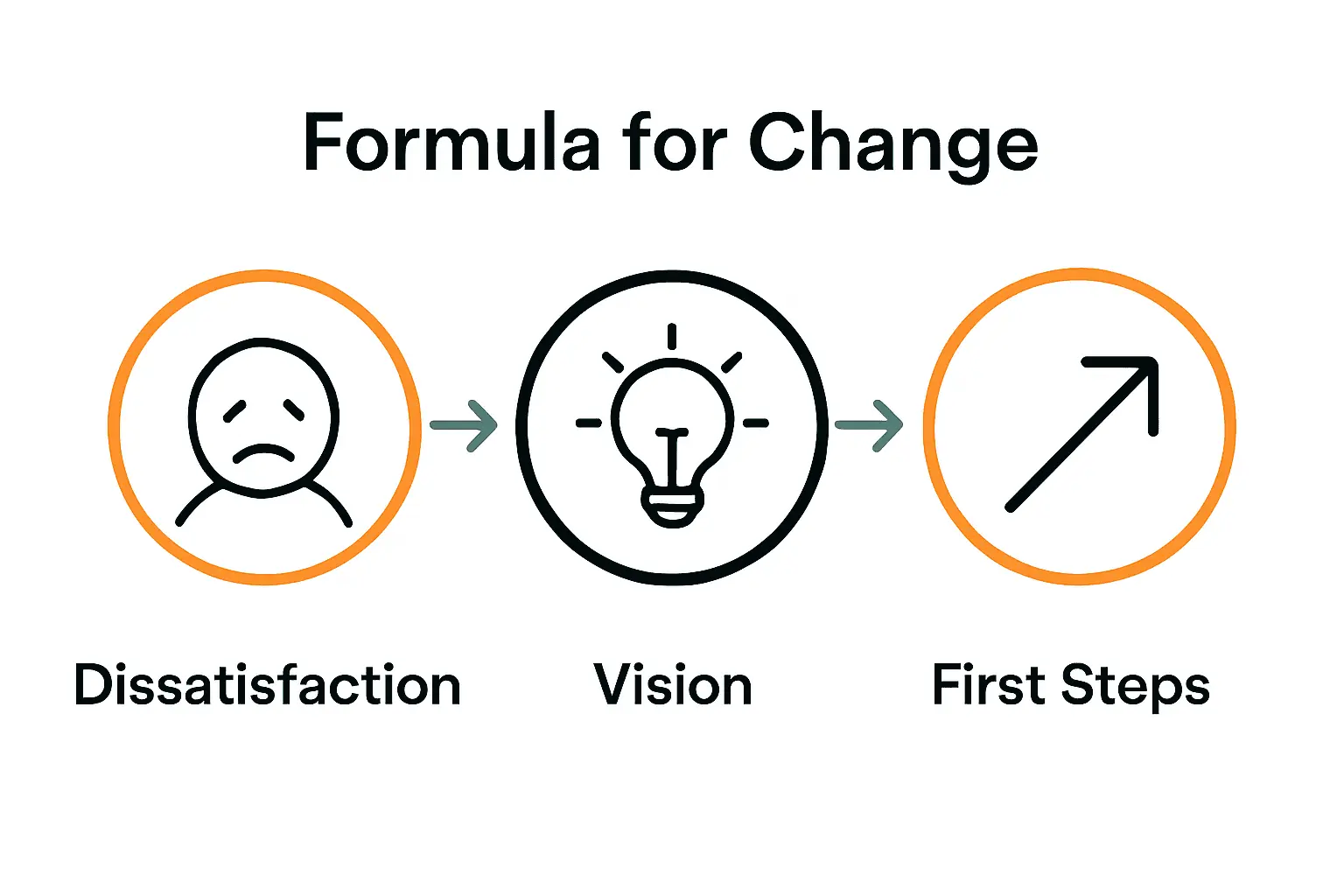Change Management Principles: Complete Guide for Organizations

Over 70 percent of organizational change efforts fail to achieve their intended goals. This striking reality underlines just how complex and challenging real transformation can be. For leaders and teams, understanding the core principles of change management goes far beyond process charts or timelines. It means mastering the human side of change, fostering trust, and tailoring strategies to fit unique company cultures. Mastering these concepts can make the difference between lasting growth and repeated setbacks.
Table of Contents
- Defining Change Management Principles And Concepts
- Types Of Organizational Change Initiatives
- Key Processes In Change Management
- Critical Success Factors And Stakeholder Roles
- Risks, Challenges, And Common Mistakes
Key Takeaways
| Point | Details |
|---|---|
| Cultural Alignment | Ensure change strategies resonate with existing organisational culture to facilitate acceptance and engagement. |
| Stakeholder Engagement | Involve all levels of personnel actively in the transformation process to promote collaboration and ownership. |
| Clear Communication | Maintain transparent and consistent messaging throughout the change process to keep stakeholders informed and engaged. |
| Continuous Evaluation | Regularly assess the impact of changes and adapt strategies as necessary to sustain effective transformation and address challenges. |
Defining Change Management Principles and Concepts
Change management represents a structured approach organisations use to transition from their current state to a desired future state, addressing both technological and human dimensions of transformation. Understanding these principles is crucial for successfully navigating complex organisational shifts.
According to research from Springer, change management involves multiple interconnected models and techniques designed to guide organisations through strategic transitions. The core philosophy recognises that successful change is not merely about implementing new processes, but fundamentally understanding and managing the human elements of transformation.
Key Change Management Principles
Effective change management typically encompasses several critical principles:
- Cultural Alignment: Ensuring change strategies resonate with existing organisational culture
- Stakeholder Engagement: Actively involving all levels of personnel in the transformation process
- Clear Communication: Providing transparent, consistent messaging about change objectives
- Leadership Commitment: Securing active support and role modelling from senior leadership
Research from arXiv emphasises the importance of adopting a systems approach to organisational change. This perspective recognises that organisations function as interconnected ecosystems where modifications in one area inevitably impact others. By understanding these complex interdependencies, leaders can design more holistic and sustainable change strategies.
The most successful change management approaches blend systematic methodologies with nuanced human understanding. They acknowledge that while strategic planning provides structure, genuine transformation occurs through meaningful engagement, empathy, and a genuine commitment to supporting individuals through transitions.
Types of Organizational Change Initiatives
Organizational change initiatives represent strategic approaches that help businesses adapt, evolve, and respond to dynamic internal and external challenges. These initiatives are not one-size-fits-all but rather nuanced strategies tailored to specific organisational needs and contexts.
According to research from arXiv, organisations typically implement multiple types of change initiatives, including intrapreneurship, internal ventures, and crowdsourcing. Each approach offers unique mechanisms for driving innovation and transformation. For instance, intrapreneurship encourages employees to develop entrepreneurial solutions within the existing organisational framework, while crowdsourcing leverages collective intelligence to generate novel ideas and strategies.
Primary Change Initiative Categories
Different change initiatives can be broadly categorised into several key types:
- Structural Change: Modifications to organisational hierarchy, departments, and reporting structures
- Strategic Change: Shifts in overall business direction, mission, or strategic objectives
- People-Centric Change: Initiatives focused on workforce development, culture transformation, and employee engagement
- Technological Change: Implementing new systems, tools, or digital transformation strategies
Research from Wikipedia) highlights three fundamental approaches to organisational change: Liberal Change, Radical Change, and Transformational Change. These approaches represent progressively deeper levels of organisational transformation, ranging from incremental adjustments to comprehensive systemic redesigns.
Successful change initiatives require more than just strategic planning. They demand a holistic understanding of organisational dynamics, a nuanced approach to human psychology, and a commitment to creating meaningful, sustainable transformations that align with the organisation’s core values and long-term objectives.
Leaders must recognize that change is not a linear process but a complex, adaptive journey requiring flexibility, empathy, and continuous learning.
 Developing Organizational Culture plays a crucial role in supporting and sustaining these transformative efforts.
Developing Organizational Culture plays a crucial role in supporting and sustaining these transformative efforts.
Key Processes in Change Management
Change management processes are systematic approaches that organisations use to plan, implement, and sustain meaningful transformations. These processes provide a structured framework for navigating complex organisational shifts while minimising disruption and maximising employee engagement.
Research from arXiv highlights the critical importance of structured change control processes, particularly in technology-driven environments. In a comprehensive case study of a large government company in Brazil, the research demonstrated how well-defined change management processes can significantly improve organisational adaptability and operational efficiency.
Core Change Management Processes
Successful change management typically involves several interconnected processes:
- Assessment and Diagnosis: Identifying current organisational challenges, strengths, and potential resistance points
- Strategic Planning: Developing a comprehensive roadmap for change, including clear objectives and measurable outcomes
- Communication Strategy: Creating transparent, consistent messaging to keep stakeholders informed and engaged
- Implementation Execution: Systematically rolling out planned changes with ongoing monitoring and support
- Continuous Evaluation: Regularly measuring change impact and making necessary adjustments
According to Wikipedia’s Formula for Change, successful organisational transformation depends on three critical elements: dissatisfaction with the current state, a compelling vision for the future, and clear first steps towards implementation. This formula emphasises that change is not just about technical processes but also about creating emotional and psychological readiness within the organisation.

Leaders must recognize that change management is an ongoing, dynamic process. It requires continuous learning, adaptability, and a genuine commitment to supporting individuals through transitions. Stress Management for Leaders becomes particularly crucial during these periods of organisational transformation, as managing personal and team resilience is key to successful change implementation.
Critical Success Factors and Stakeholder Roles
Change management success hinges on understanding the intricate interplay between various organisational stakeholders and the critical factors that drive meaningful transformation. Effective change is not a top-down directive but a collaborative journey that requires strategic alignment, commitment, and nuanced engagement across all levels of an organisation.
Research from IAEME emphasises the pivotal role of stakeholder engagement in business process re-engineering initiatives. The study highlights that successful organisational transformation depends on creating a comprehensive alignment strategy that involves and empowers individuals across different hierarchical levels and functional domains.
Key Stakeholder Roles and Responsibilities
Different stakeholders play crucial roles in change management:
- Senior Leadership: Providing strategic vision, securing resources, and role modelling change behaviours
- Middle Management: Translating strategic objectives into operational plans and supporting direct team implementation
- Frontline Employees: Executing change initiatives, providing ground-level insights, and driving day-to-day transformation
- Human Resources: Designing change communication strategies, managing cultural transitions, and supporting employee development
- External Consultants: Offering objective perspectives, specialized expertise, and structured change management frameworks
According to research from IJARSCT, three fundamental factors significantly influence change management success: leadership commitment, transparent communication, and comprehensive stakeholder involvement. These elements create a robust foundation for navigating organisational transitions effectively.
Navigating complex change requires more than strategic planning. Conflict Management Skills become essential in managing the inevitable tensions and resistance that emerge during transformational processes. Leaders must approach change with empathy, resilience, and a genuine commitment to supporting individuals through uncertain transitions.
Risks, Challenges, and Common Mistakes
Organisational change initiatives are complex undertakings fraught with potential pitfalls that can derail even the most carefully planned transformations. Understanding these risks and challenges is crucial for leaders seeking to navigate organisational transitions effectively and minimize potential negative impacts.
Research from arXiv highlights the multifaceted challenges of implementing systemic change, emphasizing the critical need for a holistic approach that integrates individual, departmental, and institutional levels. The study underscores that successful change management requires a comprehensive strategy that addresses interconnected systemic complexities.
Primary Risks and Common Mistakes
Organisations frequently encounter several recurring challenges during change management processes:
- Resistance to Change: Employees feeling threatened or uncertain about new processes
- Inadequate Communication: Lack of transparency and clear messaging about transformation objectives
- Insufficient Leadership Support: Inconsistent commitment from senior management
- Poor Change Planning: Unrealistic timelines or poorly defined implementation strategies
- Cultural Misalignment: Transformation strategies that conflict with existing organisational culture
According to Wikipedia’s research on Participatory Action Research, effective change management demands democratic leadership and responsible participation. The most significant mistakes often stem from top-down approaches that ignore the perspectives and experiences of those directly impacted by organizational transformations.
Navigating these challenges requires more than theoretical knowledge. Building Resilience in Teams becomes crucial in helping organisations develop the adaptive capacity needed to overcome inevitable obstacles and sustain meaningful change. Leaders must cultivate an environment of psychological safety, where team members feel empowered to voice concerns, contribute insights, and actively participate in the transformation journey.
Streamline Your Organisation’s Change Management with Colossus Systems
Navigating complex organisational change requires clear communication, strong leadership commitment, and comprehensive stakeholder engagement. If you face challenges like employee resistance, cultural misalignment, or insufficient leadership support, Colossus Systems offers a powerful way to manage these pain points. Our platform helps you simplify member management, improve communication strategies, and engage your community through tailored events and digital tools that foster collaboration every step of the way.

Take control of your organisational transformation today by exploring how our customizable platform can support your change initiatives. Connect with our experts to discover solutions designed to boost engagement, improve transparency, and build resilience across teams. Start your journey towards successful, sustainable change by visiting Contact Us now. Unlock the potential of your organisation with tools that align perfectly with key change management principles and practical workflows.
Frequently Asked Questions
What are the key principles of change management?
Effective change management principles include cultural alignment, stakeholder engagement, clear communication, and leadership commitment. These principles help organizations successfully navigate transitions and ensure that changes resonate with the existing culture.
How can organizations effectively engage stakeholders during change initiatives?
Organizations can engage stakeholders by involving personnel at all levels in the transformation process, creating transparent communication strategies, and ensuring that everyone’s insights and concerns are considered throughout the change journey.
What are the common challenges organizations face during change management?
Common challenges include resistance to change, inadequate communication, insufficient leadership support, poor change planning, and cultural misalignment, which can hinder the success of change initiatives.
What processes are essential for successful change management?
Core processes for successful change management include assessment and diagnosis, strategic planning, development of a communication strategy, implementation execution, and continuous evaluation to measure impact and make necessary adjustments.
Recommended
Change Management Principles: Complete Guide for Organizations

Over 70 percent of organizational change efforts fail to achieve their intended goals. This striking reality underlines just how complex and challenging real transformation can be. For leaders and teams, understanding the core principles of change management goes far beyond process charts or timelines. It means mastering the human side of change, fostering trust, and tailoring strategies to fit unique company cultures. Mastering these concepts can make the difference between lasting growth and repeated setbacks.
Table of Contents
- Defining Change Management Principles And Concepts
- Types Of Organizational Change Initiatives
- Key Processes In Change Management
- Critical Success Factors And Stakeholder Roles
- Risks, Challenges, And Common Mistakes
Key Takeaways
| Point | Details |
|---|---|
| Cultural Alignment | Ensure change strategies resonate with existing organisational culture to facilitate acceptance and engagement. |
| Stakeholder Engagement | Involve all levels of personnel actively in the transformation process to promote collaboration and ownership. |
| Clear Communication | Maintain transparent and consistent messaging throughout the change process to keep stakeholders informed and engaged. |
| Continuous Evaluation | Regularly assess the impact of changes and adapt strategies as necessary to sustain effective transformation and address challenges. |
Defining Change Management Principles and Concepts
Change management represents a structured approach organisations use to transition from their current state to a desired future state, addressing both technological and human dimensions of transformation. Understanding these principles is crucial for successfully navigating complex organisational shifts.
According to research from Springer, change management involves multiple interconnected models and techniques designed to guide organisations through strategic transitions. The core philosophy recognises that successful change is not merely about implementing new processes, but fundamentally understanding and managing the human elements of transformation.
Key Change Management Principles
Effective change management typically encompasses several critical principles:
- Cultural Alignment: Ensuring change strategies resonate with existing organisational culture
- Stakeholder Engagement: Actively involving all levels of personnel in the transformation process
- Clear Communication: Providing transparent, consistent messaging about change objectives
- Leadership Commitment: Securing active support and role modelling from senior leadership
Research from arXiv emphasises the importance of adopting a systems approach to organisational change. This perspective recognises that organisations function as interconnected ecosystems where modifications in one area inevitably impact others. By understanding these complex interdependencies, leaders can design more holistic and sustainable change strategies.
The most successful change management approaches blend systematic methodologies with nuanced human understanding. They acknowledge that while strategic planning provides structure, genuine transformation occurs through meaningful engagement, empathy, and a genuine commitment to supporting individuals through transitions.
Types of Organizational Change Initiatives
Organizational change initiatives represent strategic approaches that help businesses adapt, evolve, and respond to dynamic internal and external challenges. These initiatives are not one-size-fits-all but rather nuanced strategies tailored to specific organisational needs and contexts.
According to research from arXiv, organisations typically implement multiple types of change initiatives, including intrapreneurship, internal ventures, and crowdsourcing. Each approach offers unique mechanisms for driving innovation and transformation. For instance, intrapreneurship encourages employees to develop entrepreneurial solutions within the existing organisational framework, while crowdsourcing leverages collective intelligence to generate novel ideas and strategies.
Primary Change Initiative Categories
Different change initiatives can be broadly categorised into several key types:
- Structural Change: Modifications to organisational hierarchy, departments, and reporting structures
- Strategic Change: Shifts in overall business direction, mission, or strategic objectives
- People-Centric Change: Initiatives focused on workforce development, culture transformation, and employee engagement
- Technological Change: Implementing new systems, tools, or digital transformation strategies
Research from Wikipedia) highlights three fundamental approaches to organisational change: Liberal Change, Radical Change, and Transformational Change. These approaches represent progressively deeper levels of organisational transformation, ranging from incremental adjustments to comprehensive systemic redesigns.
Successful change initiatives require more than just strategic planning. They demand a holistic understanding of organisational dynamics, a nuanced approach to human psychology, and a commitment to creating meaningful, sustainable transformations that align with the organisation’s core values and long-term objectives.
Leaders must recognize that change is not a linear process but a complex, adaptive journey requiring flexibility, empathy, and continuous learning.
 Developing Organizational Culture plays a crucial role in supporting and sustaining these transformative efforts.
Developing Organizational Culture plays a crucial role in supporting and sustaining these transformative efforts.
Key Processes in Change Management
Change management processes are systematic approaches that organisations use to plan, implement, and sustain meaningful transformations. These processes provide a structured framework for navigating complex organisational shifts while minimising disruption and maximising employee engagement.
Research from arXiv highlights the critical importance of structured change control processes, particularly in technology-driven environments. In a comprehensive case study of a large government company in Brazil, the research demonstrated how well-defined change management processes can significantly improve organisational adaptability and operational efficiency.
Core Change Management Processes
Successful change management typically involves several interconnected processes:
- Assessment and Diagnosis: Identifying current organisational challenges, strengths, and potential resistance points
- Strategic Planning: Developing a comprehensive roadmap for change, including clear objectives and measurable outcomes
- Communication Strategy: Creating transparent, consistent messaging to keep stakeholders informed and engaged
- Implementation Execution: Systematically rolling out planned changes with ongoing monitoring and support
- Continuous Evaluation: Regularly measuring change impact and making necessary adjustments
According to Wikipedia’s Formula for Change, successful organisational transformation depends on three critical elements: dissatisfaction with the current state, a compelling vision for the future, and clear first steps towards implementation. This formula emphasises that change is not just about technical processes but also about creating emotional and psychological readiness within the organisation.

Leaders must recognize that change management is an ongoing, dynamic process. It requires continuous learning, adaptability, and a genuine commitment to supporting individuals through transitions. Stress Management for Leaders becomes particularly crucial during these periods of organisational transformation, as managing personal and team resilience is key to successful change implementation.
Critical Success Factors and Stakeholder Roles
Change management success hinges on understanding the intricate interplay between various organisational stakeholders and the critical factors that drive meaningful transformation. Effective change is not a top-down directive but a collaborative journey that requires strategic alignment, commitment, and nuanced engagement across all levels of an organisation.
Research from IAEME emphasises the pivotal role of stakeholder engagement in business process re-engineering initiatives. The study highlights that successful organisational transformation depends on creating a comprehensive alignment strategy that involves and empowers individuals across different hierarchical levels and functional domains.
Key Stakeholder Roles and Responsibilities
Different stakeholders play crucial roles in change management:
- Senior Leadership: Providing strategic vision, securing resources, and role modelling change behaviours
- Middle Management: Translating strategic objectives into operational plans and supporting direct team implementation
- Frontline Employees: Executing change initiatives, providing ground-level insights, and driving day-to-day transformation
- Human Resources: Designing change communication strategies, managing cultural transitions, and supporting employee development
- External Consultants: Offering objective perspectives, specialized expertise, and structured change management frameworks
According to research from IJARSCT, three fundamental factors significantly influence change management success: leadership commitment, transparent communication, and comprehensive stakeholder involvement. These elements create a robust foundation for navigating organisational transitions effectively.
Navigating complex change requires more than strategic planning. Conflict Management Skills become essential in managing the inevitable tensions and resistance that emerge during transformational processes. Leaders must approach change with empathy, resilience, and a genuine commitment to supporting individuals through uncertain transitions.
Risks, Challenges, and Common Mistakes
Organisational change initiatives are complex undertakings fraught with potential pitfalls that can derail even the most carefully planned transformations. Understanding these risks and challenges is crucial for leaders seeking to navigate organisational transitions effectively and minimize potential negative impacts.
Research from arXiv highlights the multifaceted challenges of implementing systemic change, emphasizing the critical need for a holistic approach that integrates individual, departmental, and institutional levels. The study underscores that successful change management requires a comprehensive strategy that addresses interconnected systemic complexities.
Primary Risks and Common Mistakes
Organisations frequently encounter several recurring challenges during change management processes:
- Resistance to Change: Employees feeling threatened or uncertain about new processes
- Inadequate Communication: Lack of transparency and clear messaging about transformation objectives
- Insufficient Leadership Support: Inconsistent commitment from senior management
- Poor Change Planning: Unrealistic timelines or poorly defined implementation strategies
- Cultural Misalignment: Transformation strategies that conflict with existing organisational culture
According to Wikipedia’s research on Participatory Action Research, effective change management demands democratic leadership and responsible participation. The most significant mistakes often stem from top-down approaches that ignore the perspectives and experiences of those directly impacted by organizational transformations.
Navigating these challenges requires more than theoretical knowledge. Building Resilience in Teams becomes crucial in helping organisations develop the adaptive capacity needed to overcome inevitable obstacles and sustain meaningful change. Leaders must cultivate an environment of psychological safety, where team members feel empowered to voice concerns, contribute insights, and actively participate in the transformation journey.
Streamline Your Organisation’s Change Management with Colossus Systems
Navigating complex organisational change requires clear communication, strong leadership commitment, and comprehensive stakeholder engagement. If you face challenges like employee resistance, cultural misalignment, or insufficient leadership support, Colossus Systems offers a powerful way to manage these pain points. Our platform helps you simplify member management, improve communication strategies, and engage your community through tailored events and digital tools that foster collaboration every step of the way.

Take control of your organisational transformation today by exploring how our customizable platform can support your change initiatives. Connect with our experts to discover solutions designed to boost engagement, improve transparency, and build resilience across teams. Start your journey towards successful, sustainable change by visiting Contact Us now. Unlock the potential of your organisation with tools that align perfectly with key change management principles and practical workflows.
Frequently Asked Questions
What are the key principles of change management?
Effective change management principles include cultural alignment, stakeholder engagement, clear communication, and leadership commitment. These principles help organizations successfully navigate transitions and ensure that changes resonate with the existing culture.
How can organizations effectively engage stakeholders during change initiatives?
Organizations can engage stakeholders by involving personnel at all levels in the transformation process, creating transparent communication strategies, and ensuring that everyone’s insights and concerns are considered throughout the change journey.
What are the common challenges organizations face during change management?
Common challenges include resistance to change, inadequate communication, insufficient leadership support, poor change planning, and cultural misalignment, which can hinder the success of change initiatives.
What processes are essential for successful change management?
Core processes for successful change management include assessment and diagnosis, strategic planning, development of a communication strategy, implementation execution, and continuous evaluation to measure impact and make necessary adjustments.